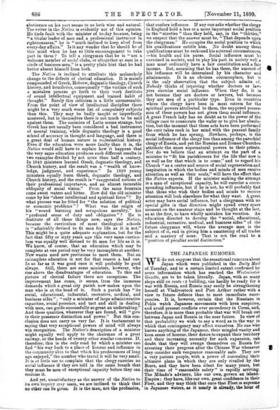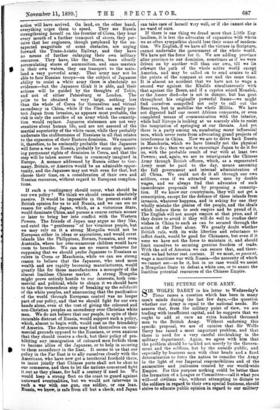THE JAPANESE RUMOURS.
WE do not suppose that the sensational rumours about Japan which were published in the Daily Mail of Tuesday, and to a certain limited extent confirmed by some information which has reached the Westminster Gazette, are to be taken literally. Japan, with so many ships still en, route cr building, can hardly be ready for a war with Russia, and Russia may easily be strengthening herself at Vladivostock and Port Arthur rather with a view to future defence than to meet immediate emer- gencies. It is, however, certain that the Russians in Pekin watch Japanese movements with keen suspicion, and avoid present conflicts over ascendency in Corea, and, therefore, it is more than probable that war will break out between Japan and Russia in the near future. In view of that probability we wish to say a word as to the way in which that contingency may affect ourselves. No one who knows anything of the Japanese, their mingled vanity and keen sense of honour, their desire to expand their territory and their increasing necessity for such expansion, can doubt that they will avenge themselves on Russia for arresting their progress after the Chinese War whenever they consider such vengeance reasonably safe. They are a very patient people, with a power of concealing their ultimate plans in which they are only rivalled by the Boers, and they have been silent for many years, but their time of -" reasonable safety" is rapidly arriving. The Mikado's advisers, like our own, govern an island- Empire ; they have, like our own, great confidence in their Fleet, and they may think that once that Fleet is supreme in Japanese waters, as it nearly is already, the hour Of action will have arrived. On land, on the other hand, everything urges them to speed. They see Russia strengthening herself on the frontier of Corea, they hear every month of a further transport of stores, they per- ceive that her engineers, though perplexed by the un- expected magnitude of some obstacles, are urging forward the Trans-Asiatic Railway, and they have no means of further enlarging their own military resources. They have, like the Boers, been silently accumulating stores of ammunition, and once masters in their own waters, they can trausport to the main- land a very powerful army. That army may not be able to face Russian troops—on the subject of Japanese ability to resist a white army there is absolutely no evidence—but the Japanese think it is able, and their actions will be guided by the thoughts of Tokio, and not of either Petersburg or London. The prize to be obtained is very large, nothing less than the whole of Corea for themselves and virtual ascendency in China, while if the Fleet can really pro- tect Japan from invasion, as appears most probable, the risk is only the sacrifice of an army which the conscrip- tion would replace. Japanese statesmen are not very sensitive about human life, and are not assured of the martial superiority of the white races, while they probably underrate the stubbornness of Russians in all that relates to the expansion of their Eastern dominion. We conceive it, therefore, to be eminently probable that the Japanese will force a war on Russia, probably by some step assert- ing permanent rights of dominion in Corea, and that the step will be taken sooner than is commonly imagined in Europe. A menace addressed by Russia either to Ger- many, Britain, or America would be an admirable oppor- tunity, and the Japanese may not wait even for that, but choose their time, on a consideration of their own and Russian resources, without regard to European complica- tions.
If such a contingency should occur, what should be our own policy ? We think we should remain absolutely passive. It would be impossible in the present state Of British opinion for us to aid Russia, and we can see no reason for aiding Japan, which, as a victorious State, would dominate China, and pursue a course certain sooner or later to bring her into conflict with the Western Powers. The friends of Japan may argue as they like, and extol the " gentleness " of her vivacious people, but we may rely on it a strong Mongolia would not be European either in ideas or aspirations, and would covet islands like the Philippines, Borneo, Sumatra, and even Australia, where her over-numerous children would have room to breathe. We can see no reason whatever for supposing that we should prefer Japanese to Russians as rulers in Corea, or Manchuria, while we can see strong reason to believe that the Japanese, who need more wealth and are rapidly becoming manufacturers, would greatly like for those manufacturers a monopoly of the almost limitless Chinese market. A strong Mongolia might prove entirely hostile to our interests, both com- mercial and political, while to obtain it we should have to take the tremendous step of breaking up the solidarite of the white peoples, and announcing that the pacification of the world through European control was no longer part of our policy, and that we should fight for our own hands alone, even at the cost of giving the coloured and non-Christian peoples an ascendency over Christian white men. We do not believe that our people, in spite of their incurable distrust of Russia, would support such a policy, which, almost to begin with, would cost us the friendship of America. The Americans may find themselves on com- mercial grounds opposed to the Russians, or even anxious that they should receive a check, but their policy of pro- hibiting any immigration of coloured men forbids them to become allies of the Japanese, or to help in securing * to them ascendency in the East. It seems to us that our policy in the Far East is to ally ourselves closely with the Americans, who have now got a territorial foothold there, to insist jointly that Chinese ports shall not be shut to our commerce, and then to let the nations concerned fight it out as they please, for half a century if need be. We would keep a. strong fleet on the coast to guard against untoward eventualities, but we would not intervene in such a war with one gun, one soldier, or one loan. Russia, we know, is safe from all but a check, and Japan can take care of herself very well, or if she cannot she is no ward of ours.
If there is one thing we dread more than Little Eng- landism, it is lest the advocates of expansion with whom we so often sympathise should lose their sense of modera- tion. We English, if we have all the virtues in Scripture, cannot undertake the government of the whole world. We have not the force for it. We are adding province after province to our dominion, sometimes as if we were driven on by another will than our own, till we lie athwart the path of the whole active world except America, and may be called on to send armies to all the points of the compass at one and the same time. It is almost an accident that we have not to wage a second war against the Khalifa simultaneously with that against the Boers, and if a caprice seized Menelek, or the Anieer died—he is not in danger, but has gout throughout his originally powerful frame—we might find ourselves compelled not only to call out the Reserves, but to mobilise the whole Militia. We have not digested half our recent African conquests, or even completed means of communication with the interior, while half Europe is locking at us scarcely able to resist the temptation of springing at our throats. And yet there is a party among us, numbering many influential men, which never rests from advocating grand projects of interference in China. Now we are to drive back Russia in Manchuria, which we have literally not the physical power to do ; then we are to encourage Japan to do it for us, with the probable result of war with at least two Powers; and, again, we are to reinvigorate the Chinese Army through British officers, which, as a regenerated Army must be paid to the day, means assuming the full government and internal administration of all China. We could not do it all through our own soldiers, even if we attracted more men by double wages, and we always find that advocates of such immoderate proposals end by proposing a conscrip- tion. If we know our countrymen, they will not get a conscription, except for the defence of these islands from invasion, whatever happens, and in asking for one they wholly mistake the genius of the people, and the ideals which induce them to seek empire and be proud of it. The English will not accept empire at that price, and if they desire to avoid it they will do well to confine their wishes in China to such as can be secured through the action of the Fleet alone. We greatly doubt whether British rule, with its wide liberties and reluctance to inflict death, would be good for Chinamen, but even if it were we have not the force to maintain it, and should limit ourselves to securing genuine freedom of trade. With the aid of America we can secure that, and there- with we had better rest content. If we must, en peasant, wage a maritime war with Russia—the necessity of which we cannot see—so be it, but in no case would we assist a Mongolian State to defeat a white one, or to annex the limitless potential resources of the Chinese Empire.











































 Previous page
Previous page